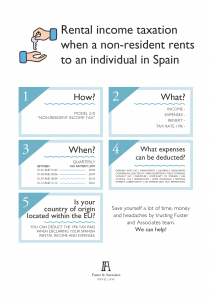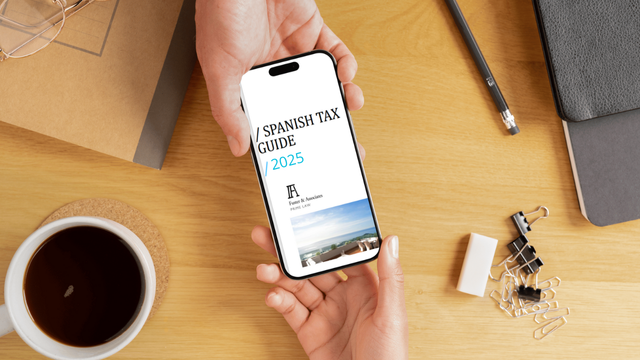Are you a non-resident in Spain? Do you own an urban property in this country?
If you’ve answered Yes to both questions, you are subject to both the spanish property taxes for non residents (Impuesto sobre la Renta de No Residentes) and a local tax known as the Real Estate Tax. (IBI)
Do you share ownership with your partner? With several other persons?
If that’s the case, each of you/them will be considered an independent taxpayer and must submit tax returns separately.
The way in which your rental income is assessed will also vary according to your tenant and whether or not this person is a VAT taxable subject.
Confusing? Slightly. Let’s tackle this topic step by step.
Tax Identification Number (NIF)
Every citizen in Spain is assigned a tax identification number which gets recorded when submitting a tax return and is used in all communications addressed to the Tax Administration.
In the case of foreign nationals, the NIF becomes the NIE or (Número Personal de Identificación de Extranjeros), Personal Identification Number for Foreigners.
This form of identification is processed before the General Directorate of the Police.
However, foreigners who don’t have a NIE – either temporarily because they are obliged to have it or permanently because they are not obliged to do so – must request a NIF from the Tax Administration when they are about to conduct any tax related matters.
Rental income taxation when a non-resident rents to an individual in Spain.
When a NON-RESIDENT rents directly to an individual or a company without any business activity in Spain – that is, he or she rents a property to a VAT non-passive subject.
The form to present to the tax authorities is known as Model 210 “Non-Resident Income Tax” (Impuesto sobre la renta de no residentes).
What does it need to be declared in this case?
Income, expenses, benefit, and a tax rate of 19%.
The 210 form will be used both to separately declare each income accrual and to declare different income streams obtained in each period as a group.
To be able to group several income streams obtained by the same taxpayer:
- These must correspond to the same type of income code,
- These must proceed from the same payer,
- The same type of spanish property taxes for non residents will apply and,
- Furthermore, if they derive from a good or right, they must come from the same good or right.
However, in the case of income from leased or subleased properties not subject to withholding, these different streams may be grouped together following the same requirements except for rental income from the same payer. When declaring rental income comes from several payers it will be necessary to indicate a specific code pertaining to the type of rent – code 35.
Grouping period:
- Quarterly, in the case of self-assessments with amounts payable,
- Annually, in the case of zero-quota self-assessments or with amounts to be refunded.
How can you submit your rental tax returns?
- On paper by printing the PDF document that results from filling out the form available on the Tax Agency’s website.
- Online.
What is the deadline for submissions?
It depends on the result of your self-assessment.
- Amounts payable: the first twenty calendar days of the months of April, July, October and January, in relation to the income the accrual dates of which are included in the previous calendar quarter.
Tax debt direct deposit: if you’re submitting your tax return online, you can pay via direct deposit between the 1st and the 15th of the months of April, July, October and January.
- With a zero-quota result: from January 1st to 20th of the year following the accrual of the declared income.
- Amounts to be refunded: from the 1st of February of the year following the accrual of the declared rental income and within a term of four years counted from the end of the period of declaration and the withholding payment. The deadline for filing the self-assessment on the date of its presentation will be understood as concluded.
Presentation period: calendar quarters.
| Between | Tax payment limit |
|---|---|
| 01-01 and 31-03 | 20-04 |
| 01-04 and 30-06 | 20-07 |
| 01-07 and 30-09 | 20-10 |
| 01-12 and 31-12 | 30-01 |
In order to prepare your spanish property taxes for non residents return, you will have to identify the tenant’ name and surname and the rental period.
If the property is not rented during a certain period, you don’t need to declare it.
If the expenses exceed the income during a certain period, you’ll state this in an informative statement made in the fourth quarter.
Expenses to be included:
All expenses needed to obtain the income as long as the landlord pays or supports them.
These are the most common expenses that you can deduct as a landlord:
- Expenses with VAT
- Cleaning
- Electricity
- Toilet
- Furniture
- Gas
- Reparations
- Management
- Middleman’s commissions
- Web advertising
- Expenses without VAT
- Community of owners
- Council tax
- Home insurance
- Mortgage interest
- No parking sign tax
- Urban entity
The taxes are paid directly to the Spanish property taxes for non residents office.
If your country of origin is located within the EU, you can deduct the 19% tax paid when declaring your Spanish rental income and expenses.
Example monthly rental 500€
| Concept | Amount |
|---|---|
| Income | 1.500€ |
| Expenses | 500€ |
| Benefits | 1.000€ |
| Taxes (-19%) | 190€ |
| Net Benefit | 810€ |
Rental income taxation when a non-resident rents to a company in Spain.
Rental income taxation when a non-resident rents to a Spanish professional or business or rental management company. In other words, when you rent your property to a VAT passive subject.
In this case, the professional or company tenant will have to conduct their business in Spain.
The landlord must register as a “Home Rental” in the Treasury and invoice the tenant.
The tenant will be a company or professional with activity in Spain.
The form to be submitted to the tax office is: Model 303 “IVA. Autoliquidación” (VAT. Self-assessment)
Declaring your VAT quarterly: the periods and deadlines are those described above.
What you are declaring here is the difference between the VAT charged for invoices issued and the VAT paid for invoices received.
You are only declaring the VAT (VAT charged less VAT paid) so you will only need to include the expenses that accrue VAT such as electricity, water, repairs, etc…
In this case, the owner must issue rent invoices to the tenant according to their percentage of ownership.
Those invoices will include a 21% VAT and the tenant will retain a 19% by law, which must be deposited in the tax office.
This payment to the tax office (that 19% withholding made by the tenant) is a payment on account of the owner who, being a non-resident in his country of origin in the EU, will have to declare the rental income and expenses in Spain, and may deduct the 19% the tenant has retained.
The following is an example of the invoice that needs to be issued for a monthly 500€ rental:
| Concept | Amount |
|---|---|
| Tax Base | 500€ |
| VAT (21%) | 105€ |
| Withheld 19% | 95€ |
The following is an example of the quarterly VAT declaration for a monthly 500€ rental:
| Tax base | VAT | |
|---|---|---|
| Income | 1.500€ | 315€ |
| Expenses | 257,93€ | -52,06 |
| VAT Total | 262,94€ |
Tax declaration for European citizen residing in Spain
If you are a European citizen and are thinking about changing your residence to Spain, keep in mind the following:
1.- Once you have been living in Spain for more than 183 days you need to get the Residence Card.
2.- After this and in order to become a Fiscal Resident you will need to fill up a “Declaration of Income” form 100.
3.- If you are retired and your yearly income is less than €12,000, you won’t need to file your tax return.
4.- Should your account balance and/or your assets or properties add to more than 50,000 € in your country of origin you will need to declare by filling up form 720 for the first year. No other declaration will be needed unless an increase of €20,000 in your assets occurs.
Do you need a representative before the Tax Office?
Except in the case of residents in countries or territories with which there is no effective exchange of tax information, there is no obligation to appoint a representative before the tax administration.
However, it is highly recommended.
The team of spanish property taxes for non residents specialists at Fuster & Associates will facilitate this complex task, breaking the language barrier and dealing with the Spanish administration, saving you all that back and forth and queue waiting.
“By trusting in Fuster & Associates, our clients are completely unconcerned, not only about filing their tax returns and keeping up with the many changes in the legislation, but also in the case of a lease verification we will be there to answer any requirements” explains Antonio Carrillo, fiscal advisor.
And don’t forget that if your property is in the holiday rental market, you are required by law not only to file your Spanish property taxes for non residents return but also to obtain a license.
And that’s something we can also help you with.
Save yourself a lot of time, money and headaches by trusting the professional team of legal and fiscal bilingual advisors at Fuster and Associates.
We want to help you navigate all the legal complexities that come with your home buying in Spain, but this article is legal information and should not be seen as legal advice.







15 Comments
Hi!
I am a non-EU resident. I would like to rent out our property in Spain. I am trying to understand what our “rental income” is. We are using a rental agency – is our income what we get from the rental agency (i.e. after they have taken their commission) or is our income what the property is advertised for?
Thank you!
Andrea
Hi Andrea.
Thank you for your comment. Residents outside the European Union, Iceland or Norway cannot deduct any expenses. You should declare the total income. And the tax rate applied to you is 24%. I hope I have helped. Best.
Geachte,
Hoeveel mag je per kwartaal aan kosten aftrekken? Moet dit in verhouding staan tot de verhuurde periode?
Voorbeeld: ik verhuur 2 maanden per kwartaal. Mag ik dan alle water, elektriciteit, gemeenschapskosten, gemeentebelasting, enz. voor een geheel kwartaal van de huurinkomsten aftrekken? Of enkel, in dit geval 2 maanden, 2/3 van de kosten?
Kunt u mij tevens laten weten welke kosten Fuster hier bij benadering voor in rekening brengt?
Uw antwoord zie ik met belangstelling tegemoet,
Met vriendelijke groet,
Ruud
hello from mary ive bought onapartment just recentaly i paied with taxes 94,oooeuro i refurbished this apartment ive decied to sell do i pay taxes agin and estate agents fee thank you mary
Hi Mary, the costs when selling a property are:
– 3% Retention Non Resident; this to be paid by non resident that sells his property. In case you do not gain money on the sale and always have paid your taxes we can claim this money for you.
– ***€ IBI/SUMA
– ***€ Council tax (Plusvalia) tax to be paid to the townhall, you have to ask them how much this will be
– ***€ Estate agent commission in case the property is sold by an agency
You may find this article useful, https://fuster-associates.com/selling-a-house-in-spain/
Kind regards,
Hi, would like to check for short term rental rules and regulations before purchasing my rental property.
Dear Sako
Where are you going to buy? Regards.
I have a small apartment in my name. Owned since 1986– Cost about £45000 (But only £16000 on Escritura) now worth about £125000 Is it worth giving it to my son?
What are the approx. costs? We are both British -not resident in Spain
Thank you Simon, an advisor will contact you soon. Kind regards.
Your example with the monthly rent of € 500,00 should show a net profit of € 810,00 instead of € 180,00.
Thanks, Jean, the errata is now fixed!
Dear Sir,
I am a stranger and owner a house in Spain but I don’t rent it.
Would you please let me know if I have to pay this non-resident tax.
Many thanks for your cooperation
Dear Abdelhammid:
Any person not resident in Spain and who has a home in Spain has to pay a tax for the property, the model 210 NRT (Non Resident Tax) for its calculation we need the receipt of IBI.
If that property was rented, the tax would be presented only for days not rented.
Should you have any doubts or questions do not hesitate to contact us.
Hi Marisa,
I am a stranger and owner a house in Spain from dec. 2018 , but I don’t rented it.
I tried to complete the form 210 , but I don’t know what to choose . Is ok if I choose : 27 SUPPLEMENTARY TAXATION (Article 19.2 Law on Non-Residents Income Tax)?
Best regards,
Anca
Dear Anca,
With your information, you should choose number 2 RENDIMIENTOS DE INMUEBLES URBANOS to declare non resident tax because of being the owner of a property in Spain.
Regards